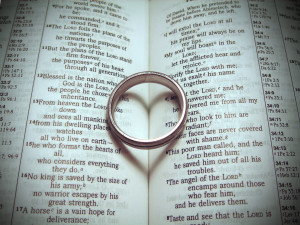 Over the last few months I have had several people ask me what the Bible says about interfaith marriage. For those who are unfamiliar with the term, interfaith marriage is a marriage between partners who profess different religions. Over the next few posts, I will share my reply in this order. 1) What does the Bible say about interfaith marriage? 2) To whom does this apply? 3) What are the practical considerations?
Over the last few months I have had several people ask me what the Bible says about interfaith marriage. For those who are unfamiliar with the term, interfaith marriage is a marriage between partners who profess different religions. Over the next few posts, I will share my reply in this order. 1) What does the Bible say about interfaith marriage? 2) To whom does this apply? 3) What are the practical considerations?
While the Old Testament has much to say about interfaith marriage, the most commonly cited New Testament passages come from Paul’s words to the Corinthians: “Do not be unequally yoked with unbelievers. For what partnership has righteousness with lawlessness? Or what fellowship has light with darkness?” (2 Cor. 6:14)[1] The phrase “unequally yoked” is a picture of a wooden bar that joins together two oxen. An unequal yoke occurs when one member of the team is significantly stronger or taller than the other. Rather than pulling together as a team, the oxen are at odds with one another.
Some believe that it is a stretch to apply this verse to marriage since the idea of matrimony is not found in the immediate context. However, a few other Pauline passages appear to move us in this direction. In 1 Corinthians 7:39, for example, explains that widows are free to marry, but “only if he loves the Lord.” Explaining his own status, Paul says that he, like Peter, has the right to marry a Christian woman (“believing wife”), but chooses not to for ministerial reasons (1 Cor. 9:5). With these kinds of verses in mind, it is understandable why Paul assumes that both husband and wife are believers when writing about marriage in Ephesians 5.
But to whom do these verses apply? This will be the subject of our next post.
[1] Old Testament passages include Exod. 34:12-16; Deut. 7:1-4; Jud. 3:6; Ezra 10:2-3; Neh. 13:25-27; Mal. 2:11.